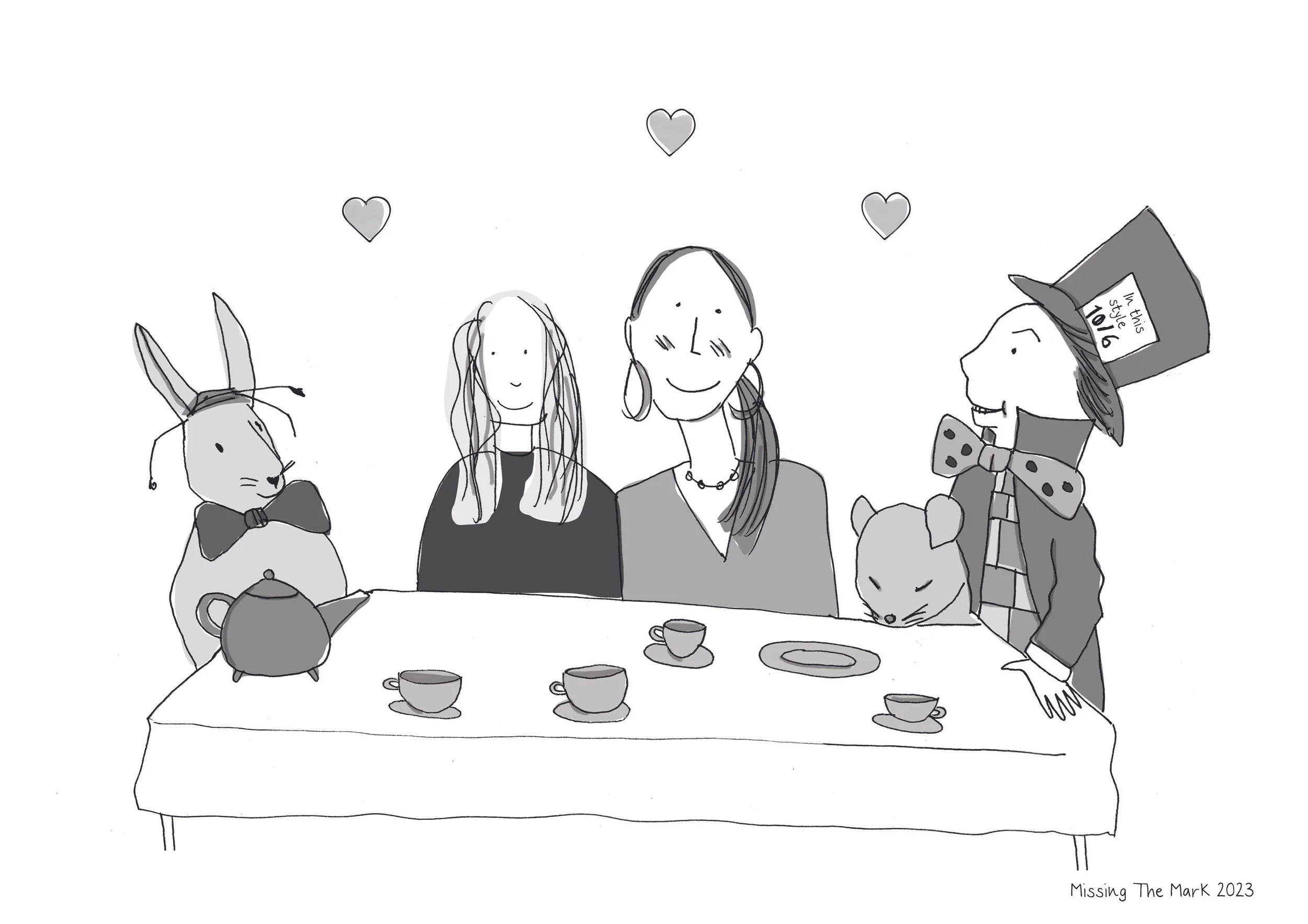
“It would be so nice if something made sense for a change”
— Lewis Carroll, Alice’s Adventures in Wonderland, 1865
Introduction: Neurodivergence & Disruptors.
This acts as an introduction page to the following sub-pages within Key Concepts:
✰ Progressive Thinking on Neurodivergence
✰ Disruptors & Critical Autism
✰ Double Empathy
✰ Ableism
✰ Neuroqueer
✰ Neuronormativity
✰ Narrative Theory
✰ Intersectionality
✰ Alice’s Wonderland Concepts
☆ Challenging Norms, Rethinking Systems, and Embracing Divergent Thinking
In Alice’s Adventures in Wonderland, the world operates by its own logic—one that defies convention, questions reality, and turns expectations upside down. Alice’s Wonderland is built on that same spirit of disruption, curiosity, and radical reimagination.
This section, Key Concepts: Neurodivergence & Disruptors, explores the foundational ideas that shape how we understand neurodivergence, leadership, identity, and systemic change. It is a space where we challenge outdated norms, rethink dominant narratives, and amplify perspectives that have long been overlooked.
☆ What You’ll Find Here
Each concept below dives into a key area of neurodivergent experience, advocacy, and thought leadership. These pages explore the work of autistic scholars, disruptors, and thinkers who have transformed how we see communication, identity, and social systems.
Sub-Pages Within Key Concepts:
Progressive Thinking on Neurodivergence
✩ An introduction to neurodiversity-affirming frameworks and the thinkers who shape them.
✩ How we move beyond medical models to embrace neurodivergence as identity and culture.
Disruptors & Critical Autism
✩ Challenging historical narratives of autism and neurodivergence.
✩ Exploring self-identification, queering norms, and rejecting pathologisation.
Double Empathy
✩ Understanding Dr. Damian Milton’s Double Empathy Problem.
✩ Why miscommunication is a two-way issue—not an Autistic deficit.
✩ The role of mutual understanding, curiosity, and relational thinking.
✩ The foundation of Wonderland: a double empathy approach as the underpinning ethos across all work
✩ Extending this, Alice’s Wonderland introduces the concept of structural empathy failure—naming the systemic inability of institutions to recognise or respond empathically across neurotypes.
Ableism
✩ Defining systemic ableism and how it shapes experiences of neurodivergent people.
✩ The hidden rules of society that exclude, marginalise, and pathologise difference.
✩ How Alice’s Wonderland rejects compliance culture and builds inclusive spaces.
Neuroqueer
✩ Introducing Nick Walker’s Neuroqueer Theory and its links to identity and autonomy.
✩ How Wonderland’s shapeshifting mirrors the fluidity of neuroqueer existence.
✩ Rejecting “normal” and embracing diverse expressions of self.
Neuronormativity
✩ Unpacking the hidden societal assumptions about “normal” brains and behaviours.
✩ How institutions enforce neurotypical standards through language, time, and logic.
✩ Why dismantling neuronormativity is central to building neuroaffirmative, inclusive systems.
Narrative Theory
✩ Storytelling as a form of epistemic, cultural, and political resistance.
✩ How neurodivergent narrative practices challenge institutional authority and normative logic.
✩ Why storytelling is central to justice, neurokinship, narrative disobedience and community-building.
Intersectionality
✩ How overlapping systems of power—such as race, gender, class, disability —shape lived experience
✩ How exclusion is compounded by multiple forms of marginalisation, and why justice work must account for these intersecting identities.
✩ How neurodivergent masking, identity, and inclusion intersect with gender, race, and social stigma, pushing intersectional frameworks further into neurodiversity justice
Alice’s Wonderland Original & Adapted Concepts
✩ Original and adapted frameworks developed within Wonderland, including Structural Empathy Failure, Narrative Disobedience, Neurokinship, neuro-misfitting and the Narrative Ecosystem.
✩ Extend existing scholarship by naming the systemic failures, cultural kinship, and narrative practices unique to neurodivergent experience.
✩ Offer new language for justice, belonging, and resistance—distinctive contributions authored through Alice’s Wonderland.
☆ Why This Matters
The ideas in Key Concepts are not just abstract theories. They directly shape the work of Alice’s Wonderland—informing how we think about people, difference, and relationship—reminding us that neurodivergence is not deficit but diversity. A double empathy approach asks us to see the world differently, to recognise that understanding flows both ways, and that connection depends on mutual attunement.
They also inform how we think about leadership, inclusion, systemic change, and the future of neurodivergent advocacy. Structural empathy failure helps us see how institutions—not just individuals—can block connection. Narrative disobedience and neurokinship remind us that stories and relationships are central to justice, belonging, and community. Intersectionality grounds this work by showing how multiple forms of oppression overlap, and why neurodivergent justice cannot be separated from wider struggles for equity.
This is a space for those who seek to challenge, unlearn, and rebuild. If you've ever felt like you didn’t fit within the existing structures of society—perhaps those structures were never designed for you. Here, we embrace new ways of thinking, new ways of communicating, and new ways of existing.
➽ Dive into this section, and let’s rethink Wonderland together.

